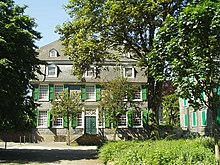 Friedrich Engels ( 28 November 1820 – 5 August 1895) was a German philosopher, social scientist and journalist, who founded Marxist theory together with Karl Marx. In 1845 he published The Condition of the Working Class in England, based on personal observations and research in Manchester.
Friedrich Engels ( 28 November 1820 – 5 August 1895) was a German philosopher, social scientist and journalist, who founded Marxist theory together with Karl Marx. In 1845 he published The Condition of the Working Class in England, based on personal observations and research in Manchester.
"You have paid more heed to other people, to strangers, and have taken no account of your mother's pleas. God alone knows what I have felt and suffered of late. I was trembling when I picked up the newspaper and saw therein that a warrant was out for my son's arrest."Friedrich Engels was born on 28 November 1820 in
Barmen, Prussia (now Wuppertal, Germany).Barmen was an expanding industrial metropolis, and Friedrich was the eldest son of a wealthy German cotton textile manufacturer. His father, Friedrich, Sr., was a Pietistic Protestant, and Engels was raised accordingly. As he grew up, however, he developedatheistic beliefs and his relationship with his parents became strained. His mother wrote to him of her concerns: She said that he had "really gone too far" and "begged" him "to proceed no further." She continued:
When his mother wrote, Engels was in hiding in Brussels, Belgium, soon to make his way toSwitzerland. In 1849, he returned to the Kingdom of Bavaria for the Baden and Palatinate revolutionary uprising.
At 17 years of age, young Friedrich had dropped out of high school due to family circumstances. He spent a year in Barmen. In 1838, his father sent the young man to work as a nonsalaried office clerk at a commercial house in Bremen. His parents expected that he would follow his father into a career in business. His revolutionary activities disappointed them. It would be some years before he joined the family firm.
Whilst at Bremen, Engels began reading the philosophy of Hegel, whose teachings dominated German philosophy. In September 1838, he published his first work, a poem entitled "The Bedouin", in the Bremisches Conversationsblatt No. 40. He also engaged in other literary and journalistic work.
Also while at Bremen, Engels began writing newspaper articles critiquing the societal ills of industrialisation. He wrote under a pseudonym, Friedrich Oswald, to avoid connecting his life in a Pietist industrialist family with his provocative writings.
In 1841, Engels joined the Prussian Army as a member of the Household Artillery. He was assigned to Berlin, where he attended university lectures and began to associate with groups of Young Hegelians. He anonymously published articles in the Rheinische Zeitung, exposing the poor employment and living conditions endured by factory workers. The editor of theRheinische Zeitung was Karl Marx. Engels did not meet Marx until late November 1842.Engels acknowledged the influence of German philosophy on his intellectual development throughout his life. He also wrote, "To get the most out of life you must be active, you must live and you must have the courage to taste the thrill of being young ... "
In Manchester
In Manchester
In 1842, his parents sent the 22-year-old Engels to Manchester, England, a manufacturing centre. He was to work in Weaste in the offices of Ermen and Engels' Victoria Mill, which made sewing threads. Engels' father thought that working at the Manchester firm might make his son reconsider some of his liberal opinions. On his way to Manchester, Engels visited the office of the Rheinische Zeitung and met Karl Marx for the first time. They were not impressed with each other. Marx mistakenly thought that Engels was still associated with the Berliner Young Hegelians, with whom he (Marx) had just broken.
In Manchester, Engels met Mary Burns, a fierce young working woman with radical opinions. They began a relationship that lasted 20 years until her death in 1863. The two never married, as both were against the institution of marriage. While Engels regarded stable monogamy as a virtue, he considered the current state and church-regulated marriage as a form of class oppression. Burns guided Engels through Manchester and Salford, showing him the worst districts for his research.
While in Manchester between October and November 1843, Engels wrote his first economic work, entitled "Outline of a Critique of Political Economy." Engels sent the article to Paris, where Marx published it in the Deutsch–Französische Jahrbücher in 1844.
While observing the slums of Manchester in close detail, Engels took notes of its horrors, notably child labour, the despoiled environment, and overworked and impoverished labourers. He sent a trilogy of articles to Marx. These were published in the Rheinische Zeitung and then in the Deutsch–Französische Jahrbücher, chronicling the conditions among the working class in Manchester. He later collected these articles for his influential first book,The Condition of the Working Class in England (1845). Written between September 1844 and March 1845, the book was published in German in 1845. In the book, Engels described the "grim future of capitalism and the industrial age", noting the details of the squalor in which the working people lived. The book was published in English in 1887.
Engels continued his involvement with radical journalism and politics. He frequented areas popular among members of the English labour and Chartist movements, whom he met. He also wrote for several journals, including The Northern Star, Robert Owen’s New Moral World, and the Democratic Review newspaper.




No comments:
Post a Comment